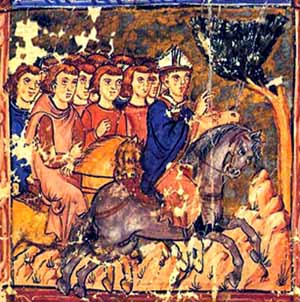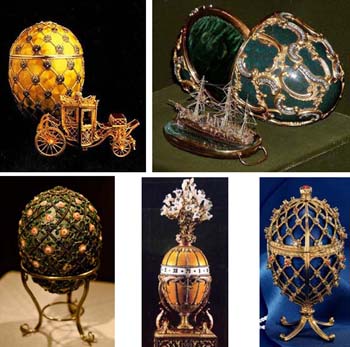 |
Organic Society
Different Types of Nobility
Plinio Corrêa de Oliveira
After the Middle Ages, a phenomenon occurred in the nobility characterized by a general loss of Faith. Until the French Revolution the nobles continued to believe, pray and practice the Faith, but the model of the warrior was laicized. Influenced by the myth of the pagan hero of the Renaissance, the ideal of the warrior changed. It was no longer to be a Crusader who would die defending the Catholic Faith, but a musketeer who would fight to prove his qualities of excellence: he was simultaneously brave, elegant, learned, a poet and very courteous.

Losing their medieval model, nobles were laicized |
This excellence - even though not as perfect as the nobility of the Crusaders – still distinguished the nobility, because every form of human excellence befits the noble.
The characteristics of the bourgeois are different from that of the noble. I am speaking here of the Catholic bourgeois in a healthy society, typically defined as a man who was serious, honest, secure and stable.
When a businessman has organized his finances well and finds he has a surplus of funds, he may well decide to take more daring steps with that money. This boldness does not necessarily imply that he will risk his life, but rather this surplus. He may indirectly risk his life, for example, by going to the Transvaal in South Africa to trade in the diamond mines there. He has to face the dangers of the trip, a hostile wild ambience that can lead to his death, but he is willing to take those risks. This courage of the businessman has a certain beauty.
The successful man of commerce also may sponsor works of charity, art and education or other beneficial works for society with his great fortune. Doing this, he manifests a generosity that, although less than military glory, has certain elements that gives him some traits of a noble.
I admit that a minor title of nobility could be given to some very refined artisans – such as Fabergé who created that superb collection of jewelry in the shape of eggs, so magnificent that the Tsar of Russia would give one to the Tsarina each year. The same could be said for the artists – because those artisans truly became artists – who would construct the royal carriages that still remain in use in the Nordic and Anglo-Saxon monarchies.
There is still another occupation in the commercial sphere that can elevate a man to a noble state. Since today’s economy is no longer a simple matter of saving one’s salary or profits, as it used to be, but constitutes a complex and extensive new science, no one can deny that it demands an intellectual effort to succeed that is comparable to that of a scholar in the university. It is a field that is clearly inferior because the commercial man is focused on personal profit while the professor is turned to a higher cause, but it is analogous. The great men of commerce or industry have to learn this science through a real effort that has merit.
These positions in the commercial and economic world generate a secondary type of excellence that, in practice, can have an enormous importance. The efforts of these men cannot simply and purely be compared to the manual work typical of the people (1).

Faberge's excellence of art made him worthy of a title
|
A bourgeois who becomes a great diplomat and plays an important role in drafting international treaties normally should also be incorporated into the nobility. Likewise, a physician who discovers the cure for a dangerous disease such as leprosy.
As one can see, the top layer of the bourgeois class can transcend its own level – and normally does so – in order to generate a petty and middle nobility. It is less than the noblesse de robe – the nobility of the robe, proper to magistrates – and in no way is comparable to the noblesse d’epée – the nobility of the sword, proper to the feudal nobles. The latter have the glory of those who are ready to die for their country and Christendom. In studying the various kinds of nobilities, we must always maintain these distinctions.
It is necessary to understand that certain professions can have greater importance in some places than in others. For instance, Venice was not strong in land, but had large fleets. To survive, it relied on its extremely skillful diplomats – and it had truly superb ones. Hence the diplomatic career raised more persons to the nobility in Venice than in other places.
In France there used to be the noblesse de cloche or noblesse de village – the parish or village nobility. It was made up of those who excelled in minor urban functions, such as the mayor or the notary who earned the general admiration and veneration of the village people because of their trustworthiness, morality and dignity.
Here you have a description of the numerous types of nobility in an organic society. Nobility is, as one can see, not something fixed and dead, but a variegated and alive class that encompasses very different types of persons. It is our duty as counter-revolutionaries to know these distinctions in order to defend organic Catholic nobility. The Revolution always hides these harmonic transitions in the nobility and tries to present it only as a very refined aristocracy in contrast with a supposedly rude and exploited people. By presenting only the two ends of the social ladder, it is easy to instill a false antagonism between the two. This sophism favors the destruction of the Catholic social hierarchy.
In fact, the strength of the nobility lies in its internal transitions. Once one denies these transitions, it becomes easier to present a caricature of the nobility and compel its destruction.
1. According to the classical definition of a Catholic society, it is divided into three classes: the clergy, the nobility and the people. The people, the third class, in its turn is divided into bourgeoisie and plebeians. Prof. Plinio here is referring to this division when he affirms that the bourgeoisie can often transcend its own class to enter the petty nobility.

Posted March 10, 2010

  | | Prof. Plinio |
Organic Society was a theme dear to the late Prof. Plinio Corrêa de Oliveira. He addressed this topic on countless occasions during his life - at times in lectures for the formation of his disciples, at times in meetings with friends who gathered to study the social aspects and history of Christendom, at times just in passing.
Atila S. Guimarães selected excerpts of these lectures and conversations from the trancripts of tapes and his own personal notes. He translated and adapted them into articles for the TIA website. In these texts fidelity to the original ideas and words is kept as much as possible.

Related Topics of Interest
 An Australian Coach for the Queen An Australian Coach for the Queen
 The Bourgeois in Free Cities and Kingdoms The Bourgeois in Free Cities and Kingdoms
 The Healthy Rise of the Bourgeoisie The Healthy Rise of the Bourgeoisie
 All Classes Should Have Elites All Classes Should Have Elites
 The City and Its Nobility The City and Its Nobility
 An Élan for Perfection Should Exist in All Classes An Élan for Perfection Should Exist in All Classes
 The City and its Nobility The City and its Nobility
 All Classes Should Have Elites All Classes Should Have Elites
 God Wanted to Give Jesus Christ Nobility of Blood God Wanted to Give Jesus Christ Nobility of Blood

Related Works of Interest
|
|
Organic Society | Social-Political | Home | Books | CDs | Search | Contact Us | Donate

© 2002-
Tradition in Action, Inc. All Rights Reserved
|
 |
|